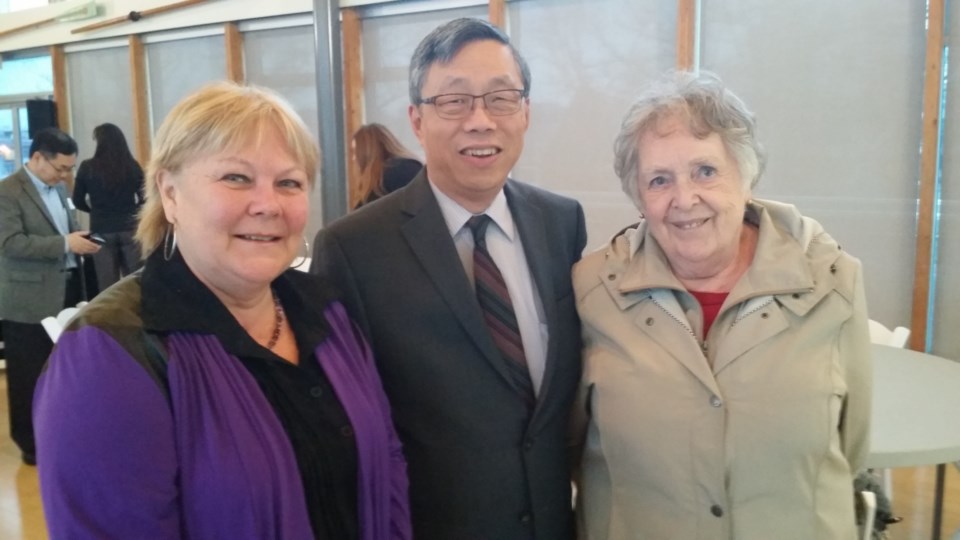Race relations were discussed by members of the public, community leaders and politicians recently at the UBC Boathouse in Richmond.
The Canadian Race Relations Foundation, along with the City of Richmond, hosted the event, part of a six-city series of dialogue on intercultural harmony.
The foundation states its goal is to “strengthen Canadian identity as it refers to democratic principles of inherent human dignity, equality, fairness and justice.”
The government-funded foundation was created in 1997, with the help of the National Association of Japanese Canadians, in an effort to not repeat the unjust treatment of Japanese Canadians during World War II.
Questions were posed by the Richmond News to the foundation’s chair, Albert Lo:
Is there racism in Richmond?
“Racism comes in all shapes and sizes and it’s all over the place. It does exist across the country and Richmond is no different. Racism has morphed from a matter of nationality. …And then it morphed into a matter of colour. …Then it morphed over time and it’s mostly packaged in the context of religion. That’s why we’re focusing on interfaith dialogue.
What would you say to the B.C. Human Rights Tribunal applicants who feel discriminated against because Mandarin is being used at their strata council meetings?
“I’m not part of that particular situation so I can’t pretend to understand or know the background of what happened there. But Canada is a free country and based on the reports I’ve heard, it’s more insensitive, as opposed to something else. …The fact of the matter is, over the years we’ve talked about the official languages of Canada, English and French. And so, for all levels of government as well as the general population …have we collectively and individually done enough of an effort to help all of the residents, including newcomers, to understand that this is our official language — English for example — and promote the use of it?
Can you promote English without laws? Should the Strata Property Act change?
“In my capacity as the chair of the foundation, what I’d prefer to do is listen to all Canadians. …What we need to do is make sure Canadians at a grassroots level speak up to those issues, when enough Canadians show concern…”
How do you judge enough? Don’t you have to make a decision at some point?
“From the foundation’s perspective, we have actively been promoting the use of official languages. We as an organization are required to conduct our business in English and French. We would like to see that happen, so we as a people, as Canadians, will be able to communicate effectively.
Is the Chinese community engaged in this dialogue? Are you worried that participation at this event wasn’t representative of Richmond?
“…Based on my very superficial observation, there’s not too much involvement, if you will, from the Mandarin-speaking community — of newer Canadians who arrived from China recently — and it was one of the things that was pointed out a few days ago by one particular group… that asked, ‘How can we take this message to (the Chinese community)?...”
Is racism different across the country? Does the fact Richmond has many business-class immigrants make class an issue here?
“What happened in Richmond, we found similar challenges in Toronto or Calgary. Similar in the sense when real estate shot up, affordability became an issue. …If we have suppliers, builders who promote the sales to certain buyers, well that’s sort of feeding into a certain trend, and that factors into all of this.”
A lot of people believe leaders aren’t doing enough. Observationally people may say things are not getting better. …Are leaders doing enough on this issue?
“Is it a simple thing for anyone to tackle? I submit it’s much more complicated than that. Go back to the mega home issue in the early and mid 1990s when there was an influx of immigrants from Hong Kong and so there was a huge problem. How long did it take for that problem to quiet down? So I don’t expect to see what I talked about (Vancouver Sun column) in 2013 to disappear overnight. If I were a policy maker I would be very careful how to approach this because you don’t want to send out the wrong signal. Lets say we shut our doors; no more business, we don’t want any more buying. What is it going to do to our economy? How is it going to help our employment situation? What is it going to do to our businesses? How is it going to then impact families? Your life? My life? And so we need to be very careful instead of making a knee jerk reaction.”
Is it just a matter of fact that Richmondites will need to continue to expect new waves of immigrants all the time? And is that fair?
“I think that’s understandable. We are all asked those questions. Then again, its very much a part of the Canadian mosaic. Look back at the 1970s and remember the so called boat people. You look at history and you look at all that angst and see all kinds of conflicts around the world and Canada is one of the few places that is so accommodating, and that’s part of the Canadian make up – compassion, humanity, equality and justice. The moment we turn our back on those values, we will be that much poorer as Canadians. So we either embrace our values and believe and hang on to them no matter what and roll with the punches and grow with it – we know that with every challenge there’s an opportunity and if we look back and look at all the things that have happened over the years – and yes there have been challenges – and look at the net benefit, that’s what we found most Canadians want.



